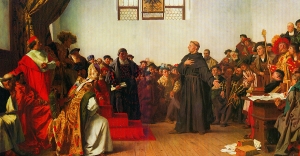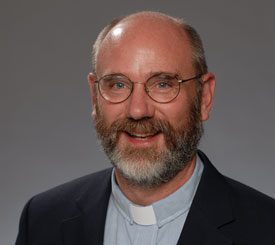On the sixteenth day of January, 1546, the Regent and cardinal arrived after night-fall at Elphingston Tower, in the neighbourhood of Ormiston, with five hundred men, and despatched the Earl of Bothwell to apprehend Wishart, holding themselves in readiness, if need were, . . . Continue reading →
Reformation History
An Interview With Evangelical Focus
Contrary to what you may have been taught, the world was made to be known and you were made to know it. Contrary to what you may have been told, the world around you, though corrupted by sin, is not an illusion and evil is not winning. Believe your eyes and ears but do not believe everything you read and hear. You can and should, however, trust that God’s Word is reliable and true, that Christ is the Saviour, that he really came, that he was really raised, and that he is really coming again to make all things right again. Until that time you and I have a great calling to trust Christ with all our heart and out of that confidence to serve him in this world by loving God and our neighbour. Find a true church where the gospel is purely preached, where the sacraments are purely administered, and where they love the people enough to practice loving, gracious discipline. Continue reading →
Tyndale On The Gospel
Evangelion (that we call the gospel) is a Greek word; and signifieth good, merry, glad and joyful tidings, that maketh a man’s heart glad, and maketh him sing, dance, and leap for joy: as when David had killed Goliah the giant, came . . . Continue reading →
Fall Conference Season 2015: Identity, Eschatology, And Authority
It is the fall conference season. Here are three gatherings about which you might want to to know. One confronts the problem of identity: do we define ourselves the way the culture would have us do it or is there a better way? The second gathers a stellar group of Reformed teachers to help us through “end times” and the third focuses on the Biblical and Reformation doctrine of “Scripture alone.” Continue reading →
On This Date: Tyndale Martyred For The Gospel
William Tyndale (c.1494–1536) was one of the most important figures in the English Reformation. He not only helped to transmit to the English-speaking world Luther’s rediscovery of the gospel of free acceptance with God for the sake of the imputed righteousness of . . . Continue reading →
Heidelcast 96: Reformation Then And Now
Confessional Reformed theology, piety, and practice does not seem to be sweeping the field in North America but it is prospering in other parts of the globe. In this episode Dan Borvan joins us to get us up to speed about the . . . Continue reading →
Audio: St Bartholomew’s Day 1572: A Sixteenth-Century Massacre
In 1572 the French Reformed Church was nearly destroyed within the space of a week in an orgy of murder. This massacre was the result of some cold-blooded political and religious calculations and a growing distrust of and hatred toward French Reformed Christians . . . Continue reading →
Identity Markers: Why Some Axioms Persist
Peter Berger has been an influential and important sociologist of religion for more than 50 years. He is presently Professor Emeritus of Religion, Sociology and Theology and Director of the Institute on Culture, Religion, and World Affairs at Boston University. To review a . . . Continue reading →
The Difference Between Sola Scriptura And Biblicism
The Reformation solas (by grace alone, through faith alone, according to Scripture alone) are not well understood today. Yesterday, however, was the anniversary of Luther’s famous declaration at the Diet of Worms. Although already under ban for his teachings, Charles V had promised . . . Continue reading →
Always Abusing Semper Reformanda
The Reformation churches have some wonderful slogans that are chock full of important truths. Sometimes, however, these slogans can be misconstrued, misreported, and misunderstood. With the possible exception of sola Scriptura (by Scripture alone), none of these slogans has been mangled more . . . Continue reading →
What’s Wrong With Reformation Day? (UPDATED)
Each year on this date confessing Protestants remember Martin Luther’s protest against the abuse of indulgences. He followed the academic custom of the day by compiling a list of theses, short statements or claims. Sometimes one would follow from the other but . . . Continue reading →
Turretin: Justification Is The Saving Doctrine And Ground Of Secession From Rome
As in the chain of salvation justification follows calling (Romans 8:30) and is everywhere set forth as the primary effect of faith, the topic concerning calling and faith begets the topic concerning justification. This must be handled with the greater care and . . . Continue reading →
Secularization Interrupted
it was becoming increasingly clear that at least on the street, the veneer of Christianity was peeling away to reveal a canvas of various native (pre-Christian) folk paganisms. As Cambridge historian Patrick Collinson concludes, the Reformation was an “episode of re-Christianization or . . . Continue reading →
The Reformation Of Worship In Geneva
The reformers did not hold back in their assault on the physical and sensory elements of traditional worship: all sacred objects such as crucifixes, statues of saints, and holy relics were removed from the temples.1 Most were systematically destroyed; a few were . . . Continue reading →
Lent: Of Good Intentions, Spiritual Disciplines, and Christian Freedom
Carter Lindberg tells the story of how the Reformation began to break out in Zürich in 1522: During Lent of 1522, Zwingli was at the house of Christoph Froschauer, a printer, who was laboring over the preparation of the a new edition . . . Continue reading →
Contra Leithart: No, The Reformation Isn’t Over
Before You Reject At Least Understand It
In a post on the First Things blog today, Peter Leithart declares the “End of Protestantism.” It’s not at all clear, however, that he understands what he wants to end. He begins with a sociological observation about contemporary English non-conformists and uses . . . Continue reading →
Reformation Day 2013: A Convict, A Commentator, And A Catechism
The good folk at Escondido URC invited me to speak for their Reformation Day celebration. Since it’s the 450th anniversary of the Heidelberg Catechism (this is the Heidelblog, after all) I spoke on the some of the personalities behind the catechism and . . . Continue reading →
On Good Intentions, Spiritual Disciplines, and Christian Freedom
Carter Lindberg tells the story of how the Reformation began to break out in Zürich in 1522: During Lent of 1522, Zwingli was at the house of Christoph Froschauer, a printer, who was laboring over the preparation of the a new edition . . . Continue reading →
Godfrey on Rome
Videos by independent film maker Anthony Parisi.
Before the Word-Faith Hucksters
Before the modern Word-Faith (“name it and claim it” or “health and wealth”) preachers there was a huckster named Johann Tetzel (1465–1519). He is famous for his marketing of the medieval practice of selling indulgences with the jingle, “When the coin the . . . Continue reading →














